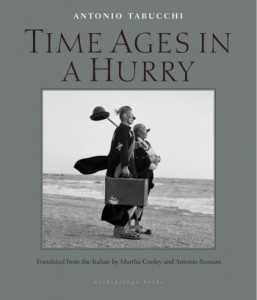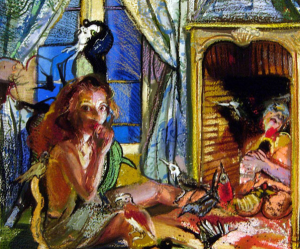Susan Bernofsky's Blog, page 43
May 1, 2015
Why I Signed the PEN Protest Letter
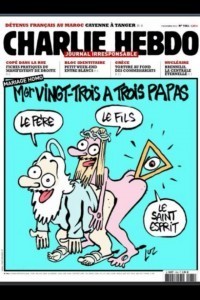
In Charlie Hebdo, Christianity gets shafted too.
As you have no doubt heard by now, six writers who were to have served as “table hosts” at the PEN American Center’s 2015 Gala recently backed out in protest of PEN’s decision to present the PEN/Toni and James C. Goodale Freedom of Expression Courage Award to the French satirical journal Charlie Hebdo. Some of them have written an open letter to PEN explaining their position – a letter that has since been signed by 145 writers (including me) and counting.
Here’s the crux of the dispute:
Both PEN and the dissenters agree that freedom of speech is crucial to defend; that the murderous attack on Charlie Hebdo‘s staff on January 7, 2015 was an unspeakable crime; and that the murder of 10 of the journal’s staff members and contributors was an act of terrorism, committed by religious fundamentalists whose deed was utterly inexcusable. When the attack occurred, PEN decried the murders immediately and continued to issue statements in support of the journal and its decision to continue publishing. The dissenters agree.
What the dissenters object to is PEN’s decision in March to make Charlie Hebdo the recipient of a prestigious PEN award. As PEN sees it, the journal’s surviving staff deserve this honor because of the heinousness of the attack against them and the courageousness of their decision to go on publishing the journal despite the attack. The dissenters, on the other hand, object that honoring the journal with this award implies a more profound and wide-ranging seal of PEN approval on the work of the journal as a whole than is appropriate. Some of the things that appear in the pages of Charlie Hebdo, when considered in the cultural context of 21st century France, make the dissenters uncomfortable. Everyone knows by now that the magazine prints racially charged caricatures of Muslims. It also prints caricatures of Jews (looking rather like the Muslims but with different clothes), as well as Catholics and other religious and political groups. Charlie Hebdo is indeed an “equal opportunity offender,” as people have taken to saying in its defense. But as the writers of the protest letter point out, “in an unequal society, equal opportunity offense does not have an equal effect.”
It’s well known that a large number of Muslims in France belong to an impoverished underclass – a legacy of France’s colonial past – and there is widespread discrimination against them. Publishing popular images mocking their features and beliefs in a context where right-wing French politicians speak openly against them with impunity contributes to a climate that makes their standing in French society precarious. While Charlie Hebdo has the right to publish such images, and it is certainly appropriate for PEN to support its right to do so, PEN’s singling out the journal to be emphatically honored above many other embattled practitioners of free speech sends a message that the organization is unconcerned with the situation of Muslims in France. And that’s a message I object to.
To be sure, this entire argument (on both sides, actually) is based on a relatively superficial analysis of the satires Charlie Hebdo publishes. For an intelligently nuanced close reading of the journal’s work, see the analysis Caleb Crain published yesterday on his blog. But close reading is largely beside the point in a debate of this sort. Political symbols are not matters of nuance, of delicate calligraphy – they are swabbed on walls with push-brooms dipped in buckets of paint. And the message on this particular wall as seen, say, from the Middle East, probably looks something like this: “PEN Says Mocking Muslims Is Courageous.” Peace-loving Muslims around the world, hearing of PEN’s lionizing of Charlie Hebdo, might reasonably conclude that the organization has no interest in them or (in the case of those who are disadvantaged minorities in France and other countries) their own lack of outlets for free expression. By merely appearing to side with the forces that oppress, say, an impoverished Muslim living in the banlieues of Paris, we contribute to his oppression. And the thought that an organization like PEN would show so little concern for this population is just disheartening to me. PEN’s position aligns it with the point of view of privilege. I can’t speak for everyone who signed the PEN protest letter – people’s reasons for signing no doubt vary – but for me, it comes down to this: I just don’t want anything that appears to further harm an already disadvantaged population done in my name. As a PEN member, I want PEN to be respectful – at the very least – of those who lack privilege and power.
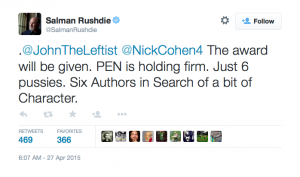 Meanwhile, I have been shocked at the way the first dissenters to go public were attacked. Salman Rushdie called them “pussies” (he later apologized for his choice of words, but the harm was already done); Simon Schama called them “stupid” (no apology so far). I’ve heard them criticized as “sententious” and “sanctimonious,” as though articulating a counter-position implied a failure of tone. Would critics of the dissenters have preferred to see the protest letter written as satire?
Meanwhile, I have been shocked at the way the first dissenters to go public were attacked. Salman Rushdie called them “pussies” (he later apologized for his choice of words, but the harm was already done); Simon Schama called them “stupid” (no apology so far). I’ve heard them criticized as “sententious” and “sanctimonious,” as though articulating a counter-position implied a failure of tone. Would critics of the dissenters have preferred to see the protest letter written as satire? 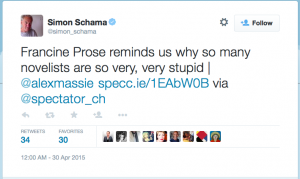 In fact, I wonder whether “sententious” isn’t the new “shrill,” especially given that the first of the letter writers to go public with her objections was a woman. I am also alarmed to see critics of the dissenters implying both subtly and directly that by objecting to the PEN award, the dissenters are aligning themselves with “the assassin’s veto.” Um, no. This is a highly inaccurate accusation, a bullying accusation, words intended to intimidate and shut down discussion and dissent.
In fact, I wonder whether “sententious” isn’t the new “shrill,” especially given that the first of the letter writers to go public with her objections was a woman. I am also alarmed to see critics of the dissenters implying both subtly and directly that by objecting to the PEN award, the dissenters are aligning themselves with “the assassin’s veto.” Um, no. This is a highly inaccurate accusation, a bullying accusation, words intended to intimidate and shut down discussion and dissent.
Fortunately voices of support have been raised as well, e.g. that of Jacob Silverman, who follows Teju Cole’s lead in suggesting that Edward Snowden and Chelsea Manning might have been more suitable recipients of this award. Well, back when I still sat on the PEN board as Chair of the Translation Committee (2011-2014), I proposed that PEN issue a statement in support of Chelsea Manning, only to be shot down by a fellow board member: “Why would we support him [sic]? He’s a criminal. He stole government property.” To this day, PEN has never said a peep about her heroic actions. Seen from that perspective, the choice of Charlie Hebdo appears utterly safe, even State Department-friendly. It will ruffle no feathers in our own government nor in the governments of our major allies. Other choices might have been riskier – courageous, even.
The post Why I Signed the PEN Protest Letter appeared first on TRANSLATIONiSTA.
April 28, 2015
2015 French-American Foundation Translation Prize Finalists
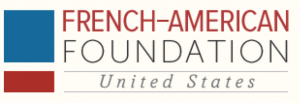 Shortlist season is in full swing. Here’s the list of finalists for the 2015 French-American Foundation’s Translation Prize. The winner in each category (fiction and nonfiction) will be awarded at $10,000 prize, funded by the Florence Gould Foundation, at an awards ceremony on June 9, 2015. With no further ado, voila:
Shortlist season is in full swing. Here’s the list of finalists for the 2015 French-American Foundation’s Translation Prize. The winner in each category (fiction and nonfiction) will be awarded at $10,000 prize, funded by the Florence Gould Foundation, at an awards ceremony on June 9, 2015. With no further ado, voila:
Finalists in Fiction:
Howard Curtis, for his translation of Invisible Love by Eric-Emmanuel Schmitt, Europa Editions
Ann Jefferson, for her translation of Winter Mythologies and Abbots by Pierre Michon, Yale University Press
Tess Lewis, for her translation of Privy Portrait by Jean-Luc Benoziglio, Seagull Books
Donald Nicholson-Smith, for his translation of The Mad and the Bad by Jean-Patrick Manchette, New York Review Books
Edward Ousselin, for his translation of Pleasures and Days and “Memory” by Marcel Proust, Dover Publications
Finalists in Nonfiction:
David Ball, for his translation of Diary of the Dark Years, 1940-1944 by Jean Guéhenno, Oxford University Press
Deke Dusinberre, for his translation of The Man Who Thought He Was Napoleon by Laure Murat, University of Chicago Press
John Lambert, for his translation of Limonov by Emmanuel Carrère, Farrar, Straus and Giroux
Lorna Scott, for her translation of Teresa, My Love by Julia Kristeva, Columbia University Press
Mbarek Sryfi & Eric Sellin, for their translation of Arabs and the Art of Storytelling: A Strange Familiarity by Abdelfattah Kilito, Syracuse University Press
Congratulations to all the finalists!
The post 2015 French-American Foundation Translation Prize Finalists appeared first on TRANSLATIONiSTA.
Translation on Tap in NYC, May 1 – 15, 2015
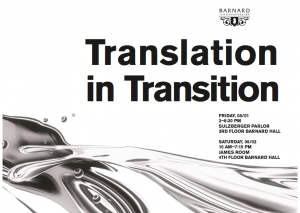 Here’s what’s coming up in Translationland NYC this early May. Let’s hope these are events are accompanied by actual spring-like temperatures!
Here’s what’s coming up in Translationland NYC this early May. Let’s hope these are events are accompanied by actual spring-like temperatures!
Friday, May 1:
Translation in Transition: The two-day conference being held at Barnard College kicks off at 2:00 p.m. on Friday and runs through the evening of Saturday, May 2. Full schedule and more information here.
Also Friday, May 1:
Trafika Europe 3 – Latvian Sojourn. Translator Margita Gailītis joins poet Liāna Langa and fiction writer Nora Ikstena to celebrate the double launch of books she’s translated by each of them for Guernica Editions. More information here. Latvian Mission, 333 E. 50th St., 6:30 p.m.
May 4 – May 10:
PEN World Voices Festival. This year’s PWV lineup contains a number of translation-themed events, including one I’m participating in. You’ll find a complete listing of the festival’s translation events here.
The post Translation on Tap in NYC, May 1 – 15, 2015 appeared first on TRANSLATIONiSTA.
April 26, 2015
Remembering Benjamin Harshav, 1928-2015
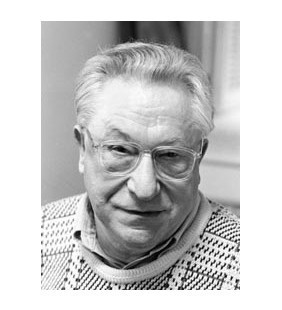 Hearing the sad news this past week of Benjamin Harshav’s passing, I asked Adriana X. Jacobs, a colleague who specializes in contemporary Israeli poetry and translation, to say a few words in tribute. This is what she wrote:
Hearing the sad news this past week of Benjamin Harshav’s passing, I asked Adriana X. Jacobs, a colleague who specializes in contemporary Israeli poetry and translation, to say a few words in tribute. This is what she wrote:
A few trembling lines on the palm of my hand.
I held them long
And let them flow through my fingers,
Word by word.”
—Jacob Glatshteyn, “A Few Lines”
translated by Benjamin and Barbara Harshav
The great literary scholar and translator Benjamin Harshav died this past week at the age of 87. Though he had been ill, the official announcement of his passing was nonetheless shocking and heartbreaking. The moment I heard the news, I shared the feeling, which others articulated, of a “void” opening up. I did not study directly with Harshav and did not know him personally, though I met him a few times while I was a postdoctoral fellow at Yale. Yet I am indebted to him in ways that reveal themselves in every project I undertake. Harshav leaves a tremendous legacy in the fields of Yiddish and Hebrew literary scholarship, but that legacy also includes his brilliant pedagogy and students who have gone on to mentor new scholars and inspire new readers. That’s hardly a void. But looking back at his oeuvre, and projects that will come into fruition in the near future, it’s clear that there was something about Harshav that made him special, incomparable, and irreplaceable.
He was born Binyamin Hrushovski in Vilna (then a part of Poland) in 1928. During WWII, his family fled to the Soviet Union, where he briefly studied math and sciences at Orenburg University and joined Dror, a Zionist-Socialist movement that was active in Poland and Germany. In 1948, he emigrated to Palestine, and following the 1948 war he enrolled in the Hebrew University of Jerusalem. From that point on, he dedicated himself to a serious study of Hebrew and Yiddish literatures that included a doctorate in Comparative Literature at Yale under the direction of René Wellek. He returned to teach in Israel at the Hebrew University and Tel Aviv University, where he founded the Porter Institute for Poetics and Semiotics and the journal Poetics Today. His teaching resume included several stints as a visiting professor in Europe and the United States, and in 1987, he returned to Yale and concluded his teaching career there, as the Jacob and Hilda Blaustein Professor of Hebrew and Comparative Literature and Professor of Slavic Literatures.
As the Yiddish poet H. Binyomin, he published a collection of poems Shtoybn (Dusts) in 1948 and was a founding member of Yung Yisroel, a group of Yiddishists in Israel. In that same period, he also started the journal Likrat, which marked a transformative moment in Hebrew poetry and was also where the poet Yehuda Amichai published his first poems. As the poet Gabi Daniel, he also published Hebrew poetry in the major literary journals of the day (a collection of his Hebrew poems followed in 1990). Harshav’s marvelous collection of essays The Polyphony of Jewish Culture (2007) offers a personal history of the development of Israeli literary culture in the statehood period, but the story of his own creative contribution to Hebrew and Yiddish literature is not as well known. The forthcoming publication in Israel of his Collected Poems, which will include both his Yiddish and Hebrew output, as well as an introduction by the scholar and translator Chana Kronfeld, promises to fill this gap.
The epigraph to this post comes from American Yiddish Poetry: A Bilingual Anthology (1986, University of California Press), a monumental undertaking and collaboration with his wife Barbara Harshav, an internationally-recognized translator from Hebrew, Yiddish, French and German and former president of the American Literary Translators Association. With Barbara, Harshav also translated into English major collections of the work of the Yiddish poet Avrom Sutzkever (Selected Poetry and Prose, 1991) and the Hebrew poet Yehuda Amichai (A Life of Poetry, 1948-1994). In his most recent publication, Three Thousand Years of Hebrew Versification: Essays in Comparative Prosody (2014), he refers to her in the acknowledgments as “my partner among books.” Their collaboration was, in a word, remarkable. Harshav also translated into Hebrew, and his translations of Yiddish literature, including the works of Sholem Aleichem, Avrom Sutzkever and Moshe Leib Halpern were highly praised. His Hebrew translation of Bertolt Brecht’s German poems appeared in 1978 under the title The Exile of Poets. And on that note, it feels right to conclude here with a poem about translators in the Harshavs’ translation:
And We Shall Not Get Excited
by Yehuda Amichai
And we shall not get excited. Because a translator
May not get excited. Calmly, we shall pass on
Words from man to son, from one tongue
To others’ lips, un-
Knowingly, like a father who passes on
The features of his dead father’s face
To his son, and he himself is like neither of them.
Merely a mediator.
We shall remember the things we held in our hands
That slipped out.
What I have in my possession and what I do not have in my possession.
We must not get excited.
Calls and their callers drowned. Or, my beloved
Gave me a few words before she left,
To bring up for her.
And no more shall we tell what we were told
To other tellers. Silence as admission. We must not
Get excited.
translated from the Hebrew by Benjamin and Barbara Harshav
The post Remembering Benjamin Harshav, 1928-2015 appeared first on TRANSLATIONiSTA.
April 25, 2015
Translation at the 2015 London Book Fair
 Two years ago I visited the London Book Fair for the first time and was chuffed (new vocabulary item!) to see how prominently translation and translators were featured. I wrote up an account of my experiences here. Since then, I unfortunately haven’t made it back again, but my colleague Julia Sherwood (who translates from Slovak) was in attendance for LBF 2015 and has written up a lively account of her adventures for Asymptote. Among other things, she attended a panel entitled “Bloody aubergine or goddam eggplant?” On more serious topics, there were panels about (the dearth of) women’s books in translation, alternate modes of publishing, what the critics think about (works in) translation, political and cultural pitfalls and more. It’s a lively account, and I recommend you check it out on the Asymptote website. (And then if you’re in the mood for a more fanciful account of LBF, ask Katy Derbyshire how her visit to London went.)
Two years ago I visited the London Book Fair for the first time and was chuffed (new vocabulary item!) to see how prominently translation and translators were featured. I wrote up an account of my experiences here. Since then, I unfortunately haven’t made it back again, but my colleague Julia Sherwood (who translates from Slovak) was in attendance for LBF 2015 and has written up a lively account of her adventures for Asymptote. Among other things, she attended a panel entitled “Bloody aubergine or goddam eggplant?” On more serious topics, there were panels about (the dearth of) women’s books in translation, alternate modes of publishing, what the critics think about (works in) translation, political and cultural pitfalls and more. It’s a lively account, and I recommend you check it out on the Asymptote website. (And then if you’re in the mood for a more fanciful account of LBF, ask Katy Derbyshire how her visit to London went.)
The post Translation at the 2015 London Book Fair appeared first on TRANSLATIONiSTA.
Translation at the 2015 PEN World Voices Festival

2015 PWV cover image: The Root of all Eves (detail) by Wangechi Mutu
There’ll be some terrific-sounding translation-flavored events at this year’s PEN World Voices Festival, to be held May 4 – 10 in various NYC locations. Here’s the lineup:
Friday, May 8:
Translation Slam: This one is a perennial Festival favorite, moderated as is traditional by Michael Moore. This year’s slam will feature competing translations from Spanish and French, as performed by Allison M. Charette, Marjolijn de Jager, Mónica de la Torre, Boubacar Boris Diop, Mariposa Fernández, and Urayoán Noel. This is a ticketed event, more information here. Nuyorican Poets Cafe, 236 E. 3rd. St., 7:00 p.m.
Saturday, May 9:
Who We Talk About When We Talk About Translation: Women’s Voices: You know the grammarian in me is dying to add back the missing “m” at the end of that initial “Who.” This is a panel I’m speaking on, with great enthusiasm, since the topic is the gender gap in the reception of translated literature by women authors, both on bookshelves and in terms of prizes. I’ll be joined by Jen Fitzgerald of VIDA, Rob Spillman of Tin House (and winner of a 2015 VIDO award for his contributions to the cause) and author Véronique Tadjo, moderated by Margaret Carson (Co-Chair of the PEN Translation Committee) and translator Alta L. Price. Admission free, RSVP recommended, more information here. Albertine Books, 972 Fifth Avenue (at 79th St.), 1:00 p.m.
Then stay for: Who We Talk About When We Talk about Translation: The Bloggers: Given that literary translation is, almost by definition, out of the American mainstream, independent publishers and independent writers writing about literature (in many cases bloggers) have played a crucial role in keeping interest in (and access to) translated literature alive in this country. Bloggers Tara Cheesman-Olmsted, Scott Esposito, Nana-Ama Kyerematen, and Michael Orthofer will tell you how it’s done, moderated by the excellent Sal Robinson. Admission free, RSVP recommended, more information here. Albertine Books, 972 Fifth Avenue (at 79th St.), 3:00 p.m.
These are the main three translation-themed events at this year’s festival. Some other events that include literary translators include:
Monday, May 4:
Monkey Business: A Japan/America Writers Dialogue in Words & Pictures. This panel will be moderated by three editors of the journal Monkey Business, including two (Ted Goossen and Motoyuki Shibata) who are also translators. Also featuring Ben Katchor, Satoshi Kitamura, Kelly Link, Aoko Matsuda. Ticketed event, more information . Asia Society, 725 Park Ave., 6:30 p.m.
Wednesday, May 6:
Armenian Genocide: A Dark Paradigm: Translator Maureen Freely (also President of English PEN) participates in this event also featuring Peter Balakian, Eric Bogosian, Nancy Kricorian, Robert Jay Lifton, Ronald Grigor Suny, and Ragıp Zarakolu. Ticketed event, more information here. SVA Theatre, 333 West 23rd St., 7:30 p.m.
Also Wednesday, May 6:
The Arrivants: This panel focusing on Kamau Brathwaite’s classic New World trilogy The Arrivants includes, in its lineup, translator (and poet) Nathalie Handal, and is moderated by translator (and scholar) Brent Hayes Edwards. Also featuring Teju Cole and Binyavanga Wainaina. Ticketed event, more information here. Crosby Street Hotel Screening Room, 79 Crosby St., 8:30 p.m.
Thursday, May 7:
The Witnesses: This panel on the role of “elders” includes Ngũgĩ wa Thiong’o, who founded the legendary Center for Writing and Translation at the University of California, Irvine. The event also features Vinie Burrows, Boubacar Boris Diop, Yusef Komunyakaa, and Achille Mbembe, moderated by Rashidah Ismaili. Free admission, RSVP recommended, more information here. The Bronx Museum of the Arts, 1040 Grand Concourse, 6:30 p.m.
Friday, May 8:
The Literary Mews at NYU: This festival-within-the-festival – a sort of literary street fair – held all day (starting at 10:30 a.m.) in NYU’s Washington Mews (map here) features several events of interest to translation enthusiasts:
Reading Between the Lines/Languages: Moroccan Poetry in Text, Translation, and Performance: Translators Omar Berrada, Alexander Elinson, and Deborah Kapchan join Moroccan poets Idriss Aissa and Driss Mesnaoui. 4:00 p.m.
The Passion of Elena Ferrante: Ferrante translator Ann Goldstein joins Rebecca Falkoff in a conversation about the anonymous Italian author. 6:00 p.m.
No reservations needed, more information here.
So those are my recommendations if you’re interested in PEN World Voices Festival events with a translation tie-in. This is one of the richest festivals to date in terms of translation goodness, so I hope you’ll turn out for at least part of it. I don’t suppose too many translation fans will be feeling so enthusiastic about this year’s PEN Gala, though, seeing that one of the 2015 honorees is Markus Dohle, CEO of Penguin Random House, now the largest trade publisher in the world, and one whose Spanish branch recently distinguished itself by slashing its translators’ paychecks across the board. Who knows, maybe Dohle will announce that this scandal has only just come to his attention and that he plans to remedy the situation at once? (I’m not holding my breath, but you can’t blame a girl for dreaming.)
The post Translation at the 2015 PEN World Voices Festival appeared first on TRANSLATIONiSTA.
April 24, 2015
Translation in Transition Conference, May 1-2, 2015
 The Center for Translation Studies at Barnard College will be hosting its 5th annual translation conference this year, this time co-organized by Mary Grace Albanese, Heather Cleary, and Bret Maney. This year’s topic, “Translation in Transition,” addresses the emergence of translation studies as a field in its own right over the last thirty or so years. Thirty years is a long time for a field to still feel cutting edge, I’d say, but something about translation and the study thereof has produced the opposite of intellectual or even institutional stability. It’s a good topic for a translation conference, and I look forward to see what the organizers and participants make of it. I’ll be participating as well in a small way, chairing and speaking on a roundtable about teaching translation.
The Center for Translation Studies at Barnard College will be hosting its 5th annual translation conference this year, this time co-organized by Mary Grace Albanese, Heather Cleary, and Bret Maney. This year’s topic, “Translation in Transition,” addresses the emergence of translation studies as a field in its own right over the last thirty or so years. Thirty years is a long time for a field to still feel cutting edge, I’d say, but something about translation and the study thereof has produced the opposite of intellectual or even institutional stability. It’s a good topic for a translation conference, and I look forward to see what the organizers and participants make of it. I’ll be participating as well in a small way, chairing and speaking on a roundtable about teaching translation.
The conference is free and open to the public, no need to register. We’ll see what happens when these panels produce standing-room-only audiences! The programs will be held in two different venues on the Barnard College campus (take the 1 to W. 116th St, enter Barnard at 117th, and Barnard Hall will be the large, elegant building right in front of you.
Friday, May 1 – Sulzberger Parlor, 3rd floor, Barnard Hall
2:00pm-4:00pm
Panel: Frontiers and Futures of Translation: The Machine Age, the Age of the Digital Humanities
John Cayley (Brown University): “The Translation of Literary Process”
Miguel A. Jiménez-Crespo (Rutgers University): “Translated Texts in Digital Spaces: Collaborative Translation and the Challenges to Translation Theory”
Audrey Lorberfeld (University of Washington): “Are You My Mother? An Exploration of Bibliographic Relationships of Translated Documents”
Mairi McLaughlin (University of California – Berkeley): “The History of News Translation and its Place in our Discipline”
Moderated by Peter Connor (Barnard College)
4:00pm-4:30pm
Coffee
4:30pm-6:30pm
Panel: Sites, Nodes, Networks, and Habitats of Translation
Michelle Woods (State University of New York – New Paltz): “Archiving Agency: the Materiality of the Translation Biblio-System”
Ahmad Ayyad (Al-Quds University): “Translation and Political Marketing: Selling the Geneva Accord to the Palestinians and Israelis”
Janet Hendrickson (Cornell University): “To Show the Truth by Allowing it to be Seen Hiding: the Functions of Lexical Excess in Anne Carson’s Nox”
Corine Tatchiris (University of Massachusetts – Amherst): “Branding World Literature: Translation at the Intersection of the Market and Academia”
Moderated by Brian O’Keeffe (Barnard College)
Saturday, May 2 – James Room, 4th floor, Barnard Hall
10:00am-12:00pm
Panel: Figures and Fables of the Translator
Bahareh Gharehgozlou (Kent State University): “Translation Criticism: English Translation of The Shahnameh by Dick Davis”
Adriana Vega Mackler (University of Connecticut): “Vistas of the Present: Translation and Representation in Salvador Benesdra and Rodolfo Rabanal”
Meg Matich (Columbia University): Iceland: Rewriting Notions of Ice and Fire through Poetry Translation”
Marko Miletich (University of Texas – Arlington): Dragomans Gaining Footing: Translators as Usurpers in Two stories by Rodolfo Walsh and Moacyr Scliar”
Moderated by Heather Cleary (Whitman College)
12:00pm-1:00pm
Break
1:15pm-3:15pm
Panel: Topoi: The “Otherwheres” of Translation
Brian James Baer (Kent State University): “Translation and the Un-making of Literary Studies”
Nimrod Reitman (New York University): “A Diva on Mute: Pasolini’s Medea“
Jamille Pinheiro Dias (Stanford University/University of São Paulo): “Utopias and Dystopias of Translation in the Ontological Turn: Implications of the Method of Controlled Equivocation”
Jenine Abboushi (Lebanese American University): “The Chosen Language: West Asia’s New Non-native Productions”
Moderated by Bret Maney (University of Pennsylvania)
3:15pm-3:45pm
Coffee
3:45pm-5:45pm
Panel: Generation, Alteration, Translation
Carolyn Shread (Mount Holyoke College): “Translation: Epigenesis of the Text”
James Petterson (Wellesley College): “Emmanuel Hocquard: ‘Taches Blanches’ in Translation”
Geoffrey Bennington (Emory University): “The Angel and the Beast”
Moderated by Nimrod Reitman (New York University)
5:45pm-6:00pm
Coffee
6:00pm-7:00pm
Round-table Topic: “Teaching Translation”
Susan Bernofsky (Columbia University)
Peter Connor (Barnard College)
Marguerite Feitlowitz (Bennington College)
7:00pm-7:15pm
Closing Remarks
Peter Connor (Barnard College)
For speaker bios and more information, see the conference website. I hope to see you there!
The post Translation in Transition Conference, May 1-2, 2015 appeared first on TRANSLATIONiSTA.
New Spaces of Translation: A Reportback
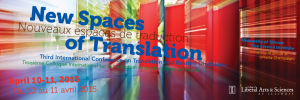 I couldn’t make it to Illinois for the New Spaces of Translation conference that Elizabeth Lowe put on together with Antoine Cazé of the Université Denis Diderot, Paris. This was the third of the annual conferences at the Center for Translation Studies of the University of Illinois, Urbana-Champaign. Anyhow, I heard that Ezra Fitz was going, so I asked him for a reportback. Here’s what he had to say:
I couldn’t make it to Illinois for the New Spaces of Translation conference that Elizabeth Lowe put on together with Antoine Cazé of the Université Denis Diderot, Paris. This was the third of the annual conferences at the Center for Translation Studies of the University of Illinois, Urbana-Champaign. Anyhow, I heard that Ezra Fitz was going, so I asked him for a reportback. Here’s what he had to say:
What do the University of Illinois at Urbana-Champaign, the Université Diderot in Paris, and the Illinois Fire Service Institute have in common? They all got together to host the Third International Conference on Translation and Related Disciplines. The schools provided the framework, the firehouse provided the facilities, and the participants enjoyed a long weekend of doing what we love: talking shop.
The weekend kicked off with a keynote by one of my favorite former professors, David Bellos. I still have a thickly-annotated copy of Life A User’s Manual (no colon!) in my office library from a class I took with him many moons ago. This time, though, he was talking about Les Misérables. The title, actually. Why was it never translated into English? It has remained, throughout history, Les Misérables, or Les Mis, if you’re into the whole brevity thing. Listening to Bellos break it down, I realized, first, why I had never thought to ask that question before, and second, why the answer is not as easy as one might think. Of course, as any translator worth his or her salt knows, it never is.
The other keynote was, shall I say, performed by professor Douglas Hofstadter of Indiana University. He presented a very short poem – just 20 syllables long! – written some 1300 years ago in classical Chinese by the poet, painter, and politician Wang Wei. Then he shared a sampler of renderings of this same poem in English by a variety of translators, some of which were taken from the provocative little volume Nineteen Ways of Looking at Wang Wei by Eliot Weinberger. He finished up with his own “rather extreme version” (his words) that he concocted many years ago, inspired by his puzzlement at the fact that, to him, none of these translations “felt Chinese” (again, his words). Doug nailed the translation, and his explanation of the choices he made was as serious as it was entertaining. Perhaps the twentieth time was the charm.
Another highlight was UCLA professor and translator from the Japanese Michael Emmerich, who took the opportunity to “fight the power,” as Chuck D said, and shared with us a cringe-worthy contract he had to negotiate before translating a novel by Banana Yoshimoto. We translators are only too familiar with the Oulipoian constraints under which we are so often bound to work, and every time someone like Michael speaks up on our behalf, it’s a small yet significant victory.
Finally, there was the panel of which Your Humble Narrator was a member. Elizabeth Lowe, who miraculously organized and orchestrated this wondrous shebang under the very literal threat of tornadoes, and Earl Fitz, both translators from the Portuguese, reminisced over their experiences learning from one of the G.O.A.T.s, Gregory Rabassa, when they were students of his at the CUNY Graduate Center in the 1970s. My father shared a story about walking into Rabassa’s office for the first time. “You’re from Iowa, right?” Rabassa asked him. “Do you say ‘creek’ or ‘crick’?” “Both,” my dad replied, “depending on whether you’re talking about a stream or a pain in your neck.” He and Elizabeth talked about what his classes were like: the way he always put national literature in the larger context of world literature, and how he reminded his students that it’s not about how fast you read, but how well you read. To that point, he would often drop by the library and check to see which of his students had actually gone to the reserve desk and signed out the books he had assigned for his classes… very apropos of the former OSS cryptographer! For my part, I reflected on what it was like to have been one of Robert Fagles’ last few students, back when he was my adviser at Princeton. The last time I saw him was in 2002, a couple of years after I graduated. He flashed a wry grin when he saw me. “Nice manifesto!” he said, remembering my thesis.
On the drive back to Nashville, I called Rabassa to let him know how the panel went. There’s something generational about all of this, I thought. Something familiar. A translation is not unlike the younger sibling of an older text. A fraternal twin, perhaps. And when translators get together at conferences such as this one, we remind ourselves once again of why it all matters. We do it for what came before us, and for what has yet to come. We do it for our literary family. We do it for the love.
Thanks so much for the report, Ezra!
The post New Spaces of Translation: A Reportback appeared first on TRANSLATIONiSTA.
April 23, 2015
Translation Shortlists, Spring 2015
Well, the Best Translated Book Award won’t be announcing its shortlists for another two weeks (suspense!), but meanwhile here are three others to keep you busy:
1. The PEN Award for Poetry in Translation has been narrowed down to:
Sorrowtoothpaste Mirrorcream by Kim Hyesoon (Action Books), translated from the Korean by Don Mee Choi
I Am the Beggar of the World (Farrar, Straus and Giroux), translated from the Pashto by Eliza Griswold
Sor Juana Inés de la Cruz by Juana Inés de la Cruz (W. W. Norton & Company), translated from the Spanish by Edith Grossman
Breathturn into Timestead by Paul Celan (Farrar, Straus and Giroux), translated from the German by Pierre Joris
Guantanamo by Frank Smith (Les Figues Press), translated from the French by Vanessa Place
2. The PEN Translation Prize shortlist looks like this:
The Gray Notebook by Josep Pla (New York Review Books), translated from the Catalan by Peter Bush
The Symmetry Teacher by Andrei Bitov (Farrar, Straus and Giroux), translated from the Russian by Polly Gannon
Baboon by Naja Marie Aidt (Two Lines Press), translated from the Danish by Denise Newman
Texas: The Great Theft by Carmen Boullosa (Deep Vellum Publishing), translated from the Spanish by Samantha Schnee
Self-Portrait in Green by Marie NDiaye (Two Lines Press), translated from the French by Jordan Stump
3. And here’s the shortlist for the Independent Foreign Fiction Prize (the one in which Translationista has a horse in the race):
The End of Days by Jenny Erpenbeck translated from the German by Susan Bernofsky (Portobello Books)
In the Beginning Was the Sea by Tomás González translated from the Spanish by Frank Wynne (Pushkin Press)
F by Daniel Kehlmann, translated from the German by Carol Brown Janeway (Quercus)
By Night the Mountain Burns by Juan Tomás Ávila Laurel translated from the Spanish by Jethro Soutar (And Other Stories)
While the Gods Were Sleeping by Erwin Mortier translated from the Dutch by Paul Vincent (Pushkin Press)
Colorless Tsukuru Tazaki and His Years of Pilgrimage by Haruki Murakami translated from the Japanese by Philip Gabriel (Harvill Secker)
If you’re holding your breath on any of these, you’ll have to keep doing so until May 13 for the PEN awards or May 27 for the Independent. (Translationista officially recommends against breath-holding. Surely there are better options for passing the time. For example, you could translate something.)
The post Translation Shortlists, Spring 2015 appeared first on TRANSLATIONiSTA.
April 14, 2015
Translation on Tap in NYC, April 16 – 30, 2015
Translation-lovers rejoice! April is not yet done bringing fabulous events your way. Behold!
Thursday, April 16:
Performance, Technology, Translation: a panel discussion and a performance. I’m listing this event even though no actual translators are involved, because it’s translation-themed and co-sponsored by Barnard’s Center for Translation Studies. Finnish playwright Otso Huopaniemi used several passes of Google Translate to transform the language of his latest play, now known as “love.abz,” and now it’s being given an American production. There’ll be a panel discussion presented beforehand in conjunction with the show, with talks on “Algorithmic Translations” (Rita Raley) and “Theatre Technicity” (W. B. Worthen). The panel will be held at 2:00 p.m. in Sulzberger Parlor, Barnard Hall (and followed by a reception); the performance itself will be at the Glicker-Milstein Theatre, Diana Center at 6:00 p.m., followed by a conversation with speakers, director, and performers at 7:00 p.m. Both events are on the Barnard Campus; enter through the main gate on Broadway at W. 117th St. More information here.
Friday, April 17:
Lecture by translation scholar Wensheng Qu: “Translations of Early Sino-British Treaties and Masked Western Legal Concepts.” Yes, another event without an actual translator, but this sounds really interesting. Wensheng Qu is a professor and Vice Dean at East China University of Politics and Law. Lecture to be held in Kent Hall, Rm. 403 on the Columbia University campus, map here. 3:00 – 4:30 p.m.
Thursday, April 23:
New Arab Dramaturgy – three playwright/translators from the Arab world – Hassan Abdulrazzah, Abdullah Alkafri, and Amahl Khouri – all three of whom are having work presented soon in NYC and who have been involved with translating plays from English to Arabic will talk about their work and the process of moving plays back and forth between the Middle East and here. Organized by Catherine Coray, moderated by Leila Buck. NYU, RSVP requested, information here. 19 Washington Square North, 6:30 p.m. – 8:00 p.m.
Friday, April 24:
“Where I’m Reading From”: Translator and essayist Tim Parks discussing his new collection of essays, Where I’m Reading From: The Changing World of Books, in which he takes on, among other things, the rise of the “global” novel, the disappearance of literary styles that do not travel well, and the increasingly paradoxical effects of translation. More information here. Book Court, 163 Court Street, Brooklyn, 7:00 p.m.
Thursday, April 30:
A Celebration of Time Ages in a Hurry, with author and translator Lynne Sharon Schwartz in conversation with translators Martha Cooley and Antonio Romani. More information here. Community Bookstore, 143 Seventh Ave., Brooklyn, 7:00 p.m.
Also Thursday, April 30:
Prominent German novelist Martin Walser and his translator David Dollenmayer present their latest collaboration, A Gushing Fountain. More information here. Goethe-Institut, 30 Irving Place, 6:30 p.m.
Grimm’s Fairy Tales! Fairy tale scholar and translator Jack Zipes joins Drawing Center curator Claire Gilman and art historian Linda Nochlin for a panel apropos of the Natalie Frank exhibit at the Drawing Center. The conversation will be followed by readings of select Grimm’s tales by Michael Cunningham, Bill T. Jones, and Ariel Levy. More information here. Brooklyn Museum, 200 Eastern Parkway, Brooklyn, 7:00 – 9:00 p.m.
The post Translation on Tap in NYC, April 16 – 30, 2015 appeared first on TRANSLATIONiSTA.
Susan Bernofsky's Blog
- Susan Bernofsky's profile
- 62 followers


